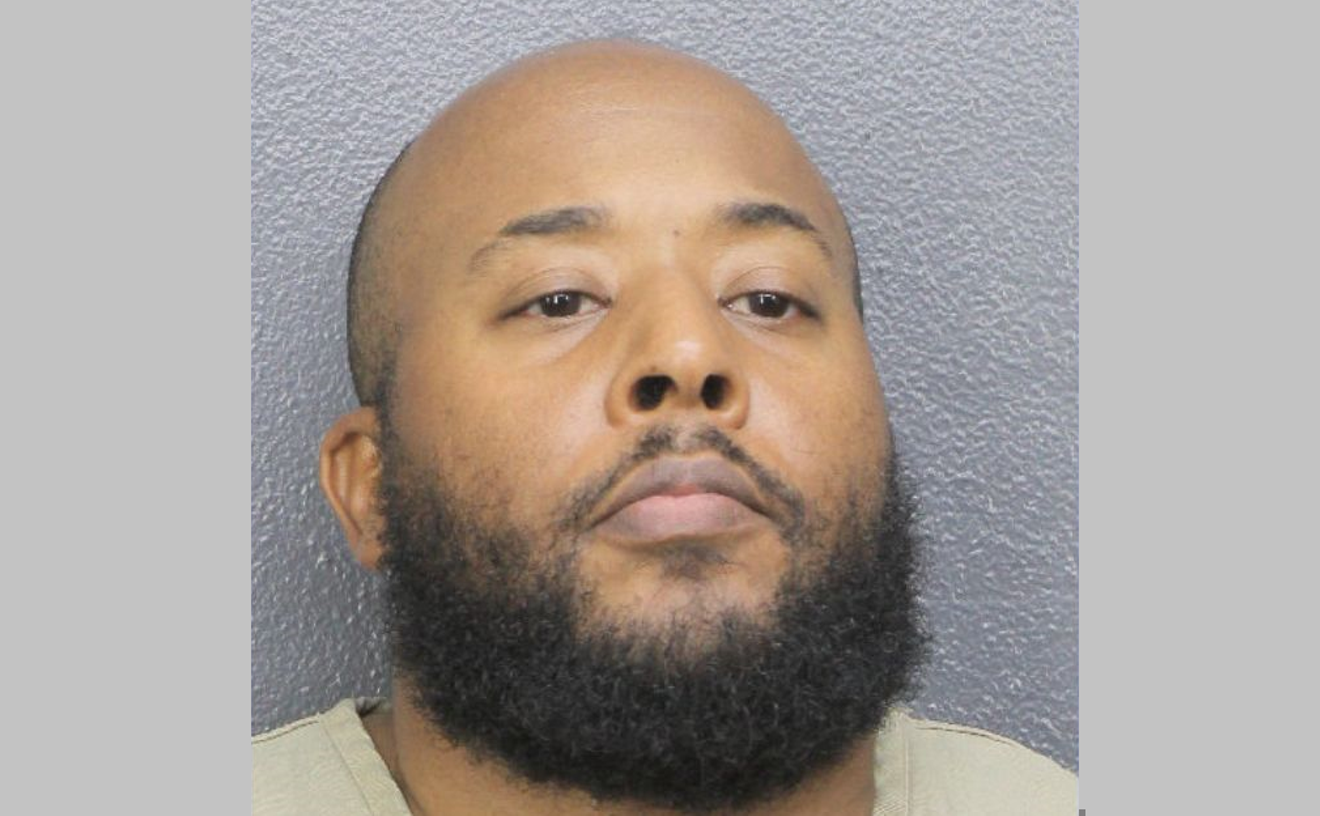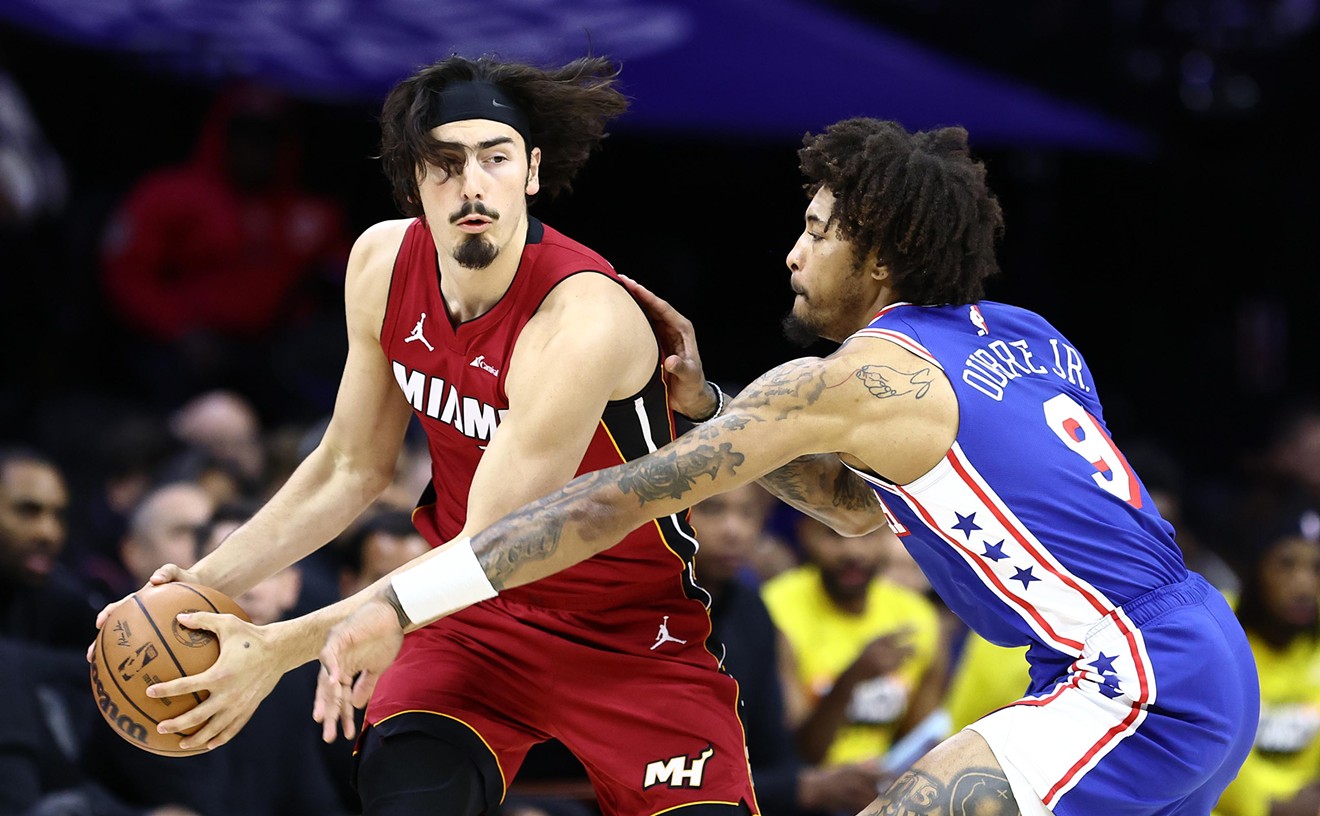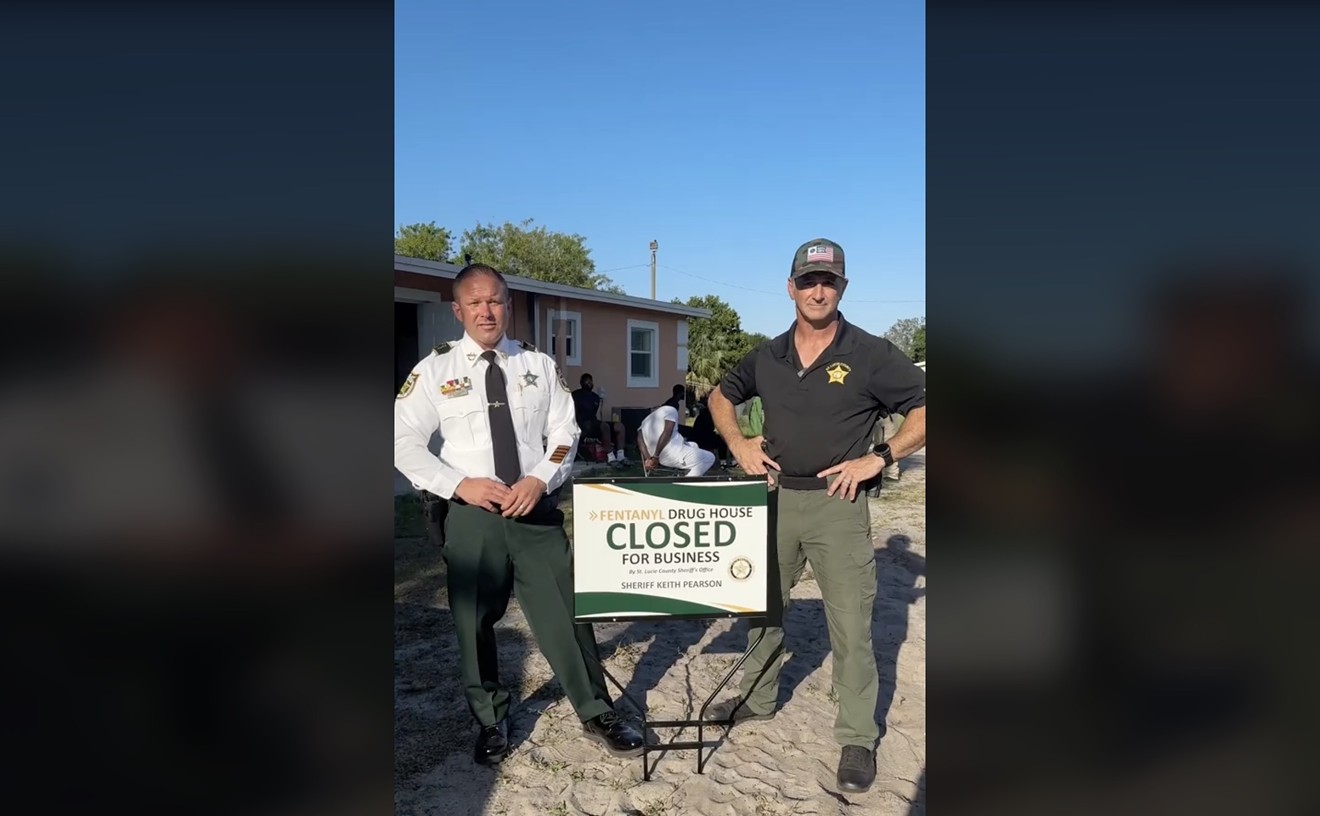Nevin Shapiro reclines on a deck chair, pulls his plush bathrobe tight, chews a cigar, and grins. All around him on the wooden deck, hundreds of drunken revelers shout, dance, and ratchet up the sexual tension. They're framed by downtown Miami's silhouette, which glitters atop the black depths of Biscayne Bay.
Shapiro's bayfront pool is covered with Plexiglas that reflects the hard glare of a professional lighting rig. Jason Ferguson, a hulking Miami Dolphins tackle, swigs Hennessy and bounces to the hip-hop sounds of DJ Irie, the Miami Heat's beatmaker. Mobs surround open bars and ogle metallic $500 bottles of Armand de Brignac champagne. Packs of gorgeous women grind on the dance floor as Fins linebacker Joey Porter shimmies past. In the middle if it all, Akin Ayodele, the veteran defender whose 29th birthday they're all celebrating, flashes a trademark grin.
It's September 22, 2008, one day after the Dolphins' upset of the New England Patriots, and half the Miami team has shown up at Ayodele's bash to begin the bye week in style.
Shapiro, in his embroidered robe, is making it all happen.
After nearly 40 years in Miami, he finally has it all: parties with Shaquille O'Neal, Dwyane Wade, and the Dolphins; lunches with police chiefs; and his name etched onto a lounge at his beloved University of Miami. He's SoBe's Jay Gatsby, a self-made runt from Brooklyn who now rules an island fiefdom that he rarely leaves.
Ayodele's party was part of a beautiful, drunken high. But it didn't last. Now, two years later, Shapiro languishes in a federal prison in New Jersey, awaiting sentencing for crafting an $880 million Ponzi scheme in what may be South Beach's largest-ever fraud case.
During the past five years, South Florida has become America's Ponzi capital — birthing Scott Rothstein, fueling Bernie Madoff, sheltering Allen Stanford, and incubating dozens of smaller schemers. Nevin Shapiro marks the homegrown nadir of this epoch of theft. Unlike the others — who spent less ostentatiously or dropped their riches elsewhere — he's the epitome of a Magic City con artist: a hard-partying, tasteless, status-obsessed gambler with a lust for harems of girlfriends, famous friends, and luxury yachts.
But lost in all the schadenfreude over his downfall has been any consideration of where he came from — and what his crimes say about the rest of us.
Truth is, Shapiro has lived his whole life surrounded by fraud. He's a violent, unstable liar who nearly blinded a SoBe club owner with a sucker punch in the mid-'90s and threatened his ex-employees. His stepfather was convicted of stealing millions decades ago, and his longtime girlfriend and business partner was indicted this past summer for stealing hundreds of thousands of dollars by bilking a beauty supply company.
In hindsight, his life story — as told through interviews with friends, family, and victims as well as voluminous court records — is a neon-lit ode to Miami's willingness to take immense and sudden wealth at face value, for better or worse.
"A guy like this, you can't possibly throw him in prison for long enough," says Jack Hulse, a Sarasota retiree who lost $440,000 to Shapiro and recently sold a house to recoup his losses. "You can't convey how many people he hurt so badly, and everyone was so willing to trust him for no reason."
Barely five-foot-six, squarely built, and baby-faced, Shapiro was wedged into the back hallway of the Stephen Talkhouse, a club on Washington Avenue. He had just snuck more than a dozen of his friends through a back door, trying to avoid the $25 cover charge. But Peter Honerkamp, the club's owner, a 41-year-old New Yorker with a handlebar mustache, had caught the group in the act and asked everyone to leave.
"Are you coming on to me?" Shapiro asked, his deep-set eyes narrowed with rage.
Honerkamp, baffled by the question, called a bouncer for help. He turned back just in time to see Shapiro's fist whistling at his face.
Honerkamp crumbled on impact. Where is all that blood coming from? he wondered, touching his face.
It all happened after midnight on April 16, 1995. Shapiro was celebrating his 26th birthday, and the violent outburst followed a turbulent adolescence and early manhood. He would brag about the devastating sucker punch for years — even as he petitioned the state to scrub from his record the criminal charges that resulted.
Shapiro was born April 13, 1969, in Brooklyn to Ronnie and Larry Shapiro, and the family moved to Miami Beach when he was young. Ronnie, his mother, was the breadwinner.
Before Nevin turned 10, his parents divorced. Court records show he was raised by Ronnie alone; it's not clear what became of his father. (A manager at Larry Shapiro's last listed address in a Bay Harbor Islands apartment complex said he had moved out without leaving a forwarding address.)
His mother, a sharp-voiced woman with a thick Brooklyn accent, worked as a secretary for connected South Beach lawyer Howard Galbut while Nevin attended Miami Beach Senior High School.
Yearbooks show the baby-faced teen played a year of varsity basketball and wrestled as a junior. It seems his athletic career stopped there. By senior year, his sole activity was participating in a leadership club (where the president was classmate Brett Ratner, now an A-list Hollywood director who made the Rush Hour series and X-Men: Last Stand).
"Nevin was a phenomenal athlete, actually," says Todd Zusmer, a friend who later played pickup basketball with Shapiro. "He was short, but he was one of the fastest guys out there."
He was also an obsessive University of Miami fan. In 1992, a Miami Herald reporter interviewed the then-23-year-old Shapiro in the Orange Bowl stands during a Hurricanes game. As the Canes fell behind , the writer described Shapiro as looking like "a caged animal about to be cornered... [or] a man in dire need of sleep. He looked crazed."
Years later, a judge asked one of Shapiro's friends whether the Beach High grad ever becomes violently angry. The reply: "Only when the Hurricanes are losing."
The year after Shapiro graduated from high school, his mom married a second time to a Canadian named Richard Armand Adam. His new stepdad seemed like an ex-pat businessman on the way up — he owned a condo in South Beach and ran a loan company called RAA International that earned more than $700,000 during the next five years.
Adam quickly attracted a partner in Connecticut, opened an office in Fort Lauderdale, and formed two firms. He did so well the family moved into a spacious house in ritzy Lighthouse Point. Nevin got his first taste of wealth there. Adam bought two yachts — a 38-foot Wellcraft and a vintage 1963 Roamer yacht named The Mitz — and leased a Cadillac Seville.
A few days after his 26th birthday, Shapiro led his friends to the Stephen Talkhouse after dinner at a nearby pizza parlor. Honerkamp, the club's owner, remembers the gold chains weighing down his neck, the entitled look in his eyes, and the need to make his friends believe he had the power to get them in for free. "He wanted to be a player," Honerkamp says.
When Shapiro was caught, he lashed out as violently as possible. Honerkamp, who now runs a Long Island club, says his eye was gruesomely lacerated by his assailant's ring. He visited five hospitals to find a specialist. "I thought he'd totally ripped off the skin under my eye, but his ring had actually bunched it into a big ball," he says. "He basically destroyed my tear duct."
Honerkamp wore a stent in his eye for a year and never regained full function. Shapiro, meanwhile, hid in Lighthouse Point. When he was arrested two months later, he lined up friends to testify that, in fact, Honerkamp had attacked him. But he must not have felt his case was strong — he pleaded guilty to felony assault in exchange for 18 months of probation and anger counseling courses.
"I glared at him the whole time in court, but he never said one word to me," Honerkamp says. "This guy was all about himself. He was just a short guy who wanted to act like a Napoleon sack of shit.
"I'm forgiving, and if he'd just simply come to me and said, 'I did an insane thing... it was in the heat of the moment,' I would have been willing to just have my expenses paid and let it drop," he adds. "But the scumbag didn't have the balls. He has no balls."
Soon after pleading guilty to the attack, Shapiro's home life fell apart. His stepfather, Richard Adam, was arrested on a federal warrant in 1997 in his native Ontario. It turned out his burgeoning businesses were based on a scam. Adam and his partners would promise firms and wealthy entrepreneurs that they could secure loans in exchange for up-front fees. The plan was so sophisticated that Adam would often fly prospects to Luxembourg, where his overseas accounts were held, to seal the deal. But the big loans never came, and Adam kept the fees. He stole almost $6 million that way.
Adam would spend almost six years in Canadian jails fighting extradition before pleading guilty to fraud.
Did Adam's white-collar crime, so similar to the one Nevin Shapiro would commit a decade later, influence his stepson? In a brief interview from Canada, where she now lives with her husband, Nevin Shapiro's mother, Ronnie, says, "Absolutely not. Absolutely not. That case is over and done with. I can't tell you anything else about it."
By 2008, this was the setting for Nevin Shapiro's life: a $6 million mansion on Bay Road with a burbling Spanish-tiled fountain in a shady front courtyard and a pool deck out back that offered 180-degree views of Biscayne Bay and Miami's skyline.
Inside, dominating the living room, was a huge television surrounded by a half-dozen smaller monitors. LED panels shone onto the wood-paneled living room and the vintage pool table. A huge mechanically controlled projection screen scrolled down in front of his bed. Two flat screens were even embedded into the kitchen wall, right next to the two ovens, presumably so Shapiro could bake and watch sports at the same time.
To round it all out, there were the $1.5 million Riviera yacht and $4,700-per-month Mercedes. Then there were the personal touches like the pinball machine, vintage tabletop arcade game, and autographed Hurricanes football helmet. Finally, there were the photos: Shapiro getting bench-pressed by Shaq, shaking hands with U.S. Attorney General Eric Holder, and watching the Canes on their practice field.
"I'll always remember the first time he showed me around that place," says DJ Irie, who lives nearby and counted Shapiro as a friend. "He was just a really cool guy. He seemed like someone who was a hard worker and who was really successful."
The house became a centerpiece of Shapiro's business empire, which had started modestly back in 1998, court records show. He had started a firm called Nevco Trading.
The business was not successful. In 1999, Nevco was sued for breaking contracts in New Jersey.
So Shapiro focused his energy on another concern, Capitol Investments USA, which was located in an office building near 41st Street and Pine Tree Drive. The firm bought wholesale groceries where they were cheap and shipped them to more expensive markets. Shapiro pocketed the difference after they were sold.
It's unclear how successful the business was, but starting around 2003, Nevin hooked up with powerful men who would help change his fortunes. They either invested millions of their own cash or brought in rich friends. One was Sherwin Jarol, a real estate maven in Chicago; then there was Craig Currie, an investor in New Jersey; and most crucial was Sydney "Jack" Williams, a real estate baron with offices in Naples, Florida, and Indianapolis.
Williams, a Sigma Chi fraternity member and graduate of Ball State University, had built his real estate company into a $1 billion-plus behemoth with clients from all over the country. Starting in 2003, working from a wood-paneled, old-money office in Naples, he used those connections to funnel millions to Nevin Shapiro.
There's still a heated debate among Shapiro's victims about what Williams, an otherwise savvy investor, saw in the South Beach businessman. But Shapiro had a gift for pitching his plans with enthusiasm and zeal. And the arrangement was a great deal for Williams, who earned a ten percent commission on each new investor he attracted, according to court filings.
Williams's old frat brothers like Jack Hulse became prime targets. "I'd invested in real estate deals with [Williams] in the past that all worked out really well," says Hulse, who lives in Sarasota. "I didn't know Nevin at all, but I trusted Jack."
Others in Naples's tony retirement world knew Williams from the golf course (he belonged to three country clubs around town).
Robert E. Nolan is a retired management exec who lives in Grey Oaks, a gated neighborhood of sprawling mansions and golf greens just outside Naples. "Pretty much everyone in this development is a millionaire, and Jack had more than a dozen of us as investors," he says.
Cash poured in to Capitol Investments USA. Williams alone brought in at least 50 investors, according to court records. In 2005, Shapiro bought the mansion at 5380 N. Bay Rd. (a deal that set him back $50,000 every month). That same year, he pledged $150,000 to his beloved Miami Hurricanes in exchange for putting his name on a student lounge.
He had an ulterior motive for that donation. Back in 2001, he'd founded a sports management company called Axcess Sports with Michael Huyghue, a Jacksonville businessman who's now commissioner of the upstart United Football League. Their biggest client was New England Patriots tackle Vince Wilfork, and Shapiro thought UM athletes would build the business.
As Shapiro's wealth grew, so did his standing in clubby, flashy SoBe, where he dropped huge money at Mansion nightclub and Prime One Twelve, his top dinner spot. He even developed a friendship with Miami Beach Police Chief Carlos Noriega. Public documents describe the two eating breakfast together at David's Cafe — Shapiro's favorite meeting place. (Noriega declined to comment on his relationship with the Ponzi schemer.) While the two dined, Shapiro received a threatening phone call and used Noriega as his witness on a police report. No charges were ever filed.
Shapiro later met Holder, the U.S. attorney general, through Noriega. Miami Beach officers also routinely guarded Shapiro's house during parties, sources say.
Then there were his other passions: gambling and women. SEC filings show he had "millions in gambling debts." Shapiro would lay $25,000 or more on several NFL and college football games every weekend, says an associate who asked not to be named.
Once, after a big win, a Federal Express box overflowing with cash arrived at the Bay Road mansion. Shapiro dramatically poured the bills all over his kitchen counter while laughing hysterically, the source says. When he watched games in public — often at Lucky Strike Lanes off Lincoln Road — he'd scream at strangers rooting for the "wrong" team, especially if he was losing.
He also juggled several girlfriends, in addition to his longtime partner, a woman named Miriam "Mimi" Menoscal. Records show he let one female acquaintance charge $116,000 to his credit cards.
It was an exhausting, exhilarating life.
Between 2005 and 2009, he spent $400,000 on floor seats at Heat games. He rented his yacht to Shaq, D-Wade, and Boston Celtics star Kevin Garnett. Lawyers claim he gave Shaq diamond-encrusted handcuffs for his birthday. (The Big Aristotle later told Cleveland reporters Shapiro had only helped him arrange purchase of the gems.)
Despite the over-the-top spending, "he didn't come across as braggadocious or like he was showing off," says DJ Irie.
Irie also knew Scott Rothstein — the Broward lawyer who pleaded guilty this past January to crafting a $1.2 billion Ponzi scheme. Irie recalls sitting in a meeting with Rothstein at Nikki Beach when a charity employee mentioned they were $500,000 short for a project.
"Without even skipping a beat, Scott was like, 'Oh, I got it. I'll pay it,'" Irie says. "I know some really successful lawyers, and they don't get down like that. I knew right then that something wasn't right. But I never once had a moment like that with Nevin. He seemed legit."
Shapiro stalks through hundreds of high school football players in full pads in the summer heat on Coral Gables' Greentree Field, where the Hurricanes practice. He looks terrible: His clothes are rumpled and stained. His eyes are bugged out in rage. His youthful face is pockmarked and discolored as if he'd lost a street fight.
It's UM's annual summer camp for top high school players from around the state, and Shapiro has been tipped off that an old associate — an assistant whom Shapiro believed owed him money — would be at the practice.
Dozens of players stare, mouths agape, as this maniac makes his way across the field. Quinton Dunbar, now a wide receiver at the University of Florida, stops midsentence.
Shapiro juts a finger into the assistant's face. "You need to start answering your fucking phone," he hollers, waving his arms. A few players tense up, but Shapiro pulls him away by the arm. After a minute of screaming, he saunters back to his car and peels away.
It was August 2009, and Nevin Shapiro's charmed life was fracturing. The Ponzi scheme had begun to teeter. Shapiro promised investors they'd receive 10 to 26 percent commissions every month. Since his "grocery diverting" no longer traded so much as a box of Cheerios, the only way to pay that fee was new money. And lots of it.
The first sign of trouble came a few weeks after the king of all Ponzi schemers — Bernie Madoff, who rigged a $65 billion pyramid — was arrested in December 2008.
Susan Grinwis, a Naples retiree with $150,000 invested, reached Shapiro on his cell. She'd always had reservations about the flashy businessman from Miami. Earlier that year, he had shown up for a meeting at Jack Williams's palatial $5 million mansion in Naples with a street-tough bodyguard. In a crowd of genteel retirees, he looked as out of place as a golfer dressed in plaid at a Lil Wayne show.
"Are you a Bernie?" Susan asked Shapiro, reaching him on his cell. "Please tell me you're not a Bernie."
In the slick, confident tones that had roped in so many, Shapiro convinced her to keep her money invested. His business was legitimate, he said. But just six months later, starting around July 2009, Shapiro stopped paying interest to his investors.
He'd done everything he could to forestall that day, court records show. That same month, he called an unnamed investor, begging for $170,000.
Toward the end of July, Robert Nolan and his wife drove to Miami Beach for a confrontation. Shapiro gave no sign his world was falling apart, Nolan says. Meeting in his simple office off Pine Tree Drive, he was reassuring, telling the couple a grocery chain was slow in paying but the cash flow would soon restart. Nolan agreed not to immediately demand his $500,000: "[Shapiro] was a very shrewd guy, and we believed him."
But another two months went by, and no payments came. The Nolans confronted their friend, Jack Williams. He told them if Shapiro went bankrupt, everyone would be screwed. "Just give him a little more time," he pleaded.
By November, it was too late. Sherwin Jarol, the Chicago real estate investor, sued to force Shapiro and Capitol Investments USA into bankruptcy. Three other investors quickly filed suit in Miami-Dade.
Process servers began hunting for Shapiro, who shuttered his office and tried to disappear. A woman named Lily accepted a subpoena at the Bay Road mansion. One server found Shapiro sipping coffee outside David's Cafe, wearing dark sunglasses. He insisted he wasn't Nevin Shapiro until a passing friend ID'd him.
The feds joined in the hunt on November 30, after Jarol filed his involuntary-bankruptcy case.
Shapiro's sham was quickly exposed. In a federal filing this past March, he listed as his personal assets the $5.4 million mansion and $87,897.53 in personal belongings (including $2,750 in scrap gold). His unpaid debts to investors, meanwhile, totaled more than $133 million. The grocery business was worthless.
The search for money quickly turned comical. In a deposition a few weeks later, Shapiro talked about a pair of $120,000 rings. One had "fallen off a boat" a few weeks after he bought it, he said, while the other had been given to someone named "Raul."
More than 60 investors — mostly from Naples, Indianapolis, and Chicago — lined up to file claims against Shapiro. There were big names: Barry Alvarez, the University of Wisconsin athletic director and former football coach, had sunk $600,000 into the scheme; Charles W. Brown, owner of one of the Midwest's biggest Taco Bell franchises, lost $490,000.
Inside Naples's expensive country clubs, panic set in. Nolan wasn't in danger of losing his house, but he says some friends were forced to give up their lives of late-morning tee times and martinis to return to work.
"There's a lot of people hurting out here," he says. "I never invest more than I can afford, but a lot of folks lost their shirts."
On April 21, federal agents arrested Shapiro on a warrant issued by the U.S. District Court in New Jersey, where Currie — one of his biggest investors — lives. In the SEC's criminal indictment, prosecutors spelled out the scope of the crime: An $880 million Ponzi scheme had fueled at least $38 million in spending on the manse, ladies, and gambling.
Shapiro's voice, husky and calm, sounds just after the beep of a voice-mail message: "Dude, it's Nevin. I told you'd I'd call you at 9:30, and you didn't answer. I called you four times. It's really a lack of courtesy and respect you give me... I think you should answer a call from me. It's the least you could do. Especially from the position I'm sitting in."
Three more calls come in the next three days. By the last one, Shapiro is unhinged:
"Listen up, you fucking white-bread fucking trash... piece of shit. I'm telling you, you fucking better fucking take a call from me, bro. If not, you're going to have to get a criminal attorney, I'm telling you... little cunt. OK, bye."
The calls, made last month from a prison in New Jersey, were left on the cell phone of an associate who asked not to be named. They plainly illustrate Shapiro's desperate state of mind.
After pleading guilty this past September, with a decades-long term possible at sentencing next month, Shapiro is lashing out the only way he can. He's going down swinging.
Despite all the good times, friends melted away after the arrest. On April 28, UM announced it had removed Shapiro's name from the student lounge two years before because he'd stopped paying on his pledged donation.
Then, three months after Shapiro headed to jail, his longtime business partner, Miriam "Mimi" Menoscal, was arrested and charged with running her own six-figure fraud. The pair had co-owned a firm called Benjaminz Properties, an aborted attempt at a hip-hop fashion line with DJ Irie. They had dated on and off for more than a decade, sources say. Menoscal owned many properties around Miami-Dade, including a $4.6 million mansion in Indian Creek.
In July, though, federal agents arrested Menoscal and a woman named Maida Ponce. The pair had set up wholesale shipments to a beauty supply company called Deseo Inc. The feds claimed they had kept the up-front payments without ever shipping any product, stealing at least $380,000.
That setup — a wholesale shipment that brought in cash without delivering anything — would sound familiar to any of Nevin Shapiro's victims. But if he had any hand in Menoscal's case, it doesn't show in the court records. Menoscal pleaded guilty in September.
Shapiro faces up to 20 years as well as a $5 million fine for securities fraud and ten years and $250,000 for money laundering; the feds are still trying to sort out who else helped engineer the scheme.
And Joel Tabas, the trustee overseeing Shapiro's estate, has sued Jack Williams, trying to recover more than $100 million he says Williams gained through Shapiro's business. Williams hasn't been criminally charged, but he pleaded the Fifth more than 850 times in a deposition in September — suggesting he has good reason to worry.
Through his lawyer, Williams has maintained that he's another victim in Shapiro's Ponzi scheme. "Please do not assume that Jack's invocation of his Fifth Amendment privilege is any sort of admission of culpability on his part. It is not," Martin Raskin, his lawyer, told Indianapolis Business Journal in September.
Williams's realty office remains open in Naples. His card is prominently displayed on the front desk, though he wasn't in on the afternoon New Times visited last month. He didn't respond to a message left with his partner. But Williams filed for bankruptcy protection this past September 30, listing more than $10 million in creditors — including several Shapiro investors like Jack Hulse — and $6.3 million in assets.
Still, many of Shapiro's victims in Naples don't believe Williams knew anything about the fraud. "Jack is devastated. He's lost a lot of money and a lot of friends," Susan Grinwis says.
Shapiro, meanwhile, hasn't let his time in a New Jersey prison pass quietly. In addition to spewing threatening voice mails from his jail cell, he called the Miami Herald with a big announcement this past August: He's writing a book.
To be titled The Real U: 2001 to 2010. Inside the Eye of the Hurricane, it will bring his once-beloved athletic program to its knees with information on more than 100 athletes who broke NCAA rules, Shapiro promises.
Shapiro seems to feel burned — by his partners, the sports agency that never worked out, and his onetime friends. Now, he's ready to burn them all back. "Once the players turned pro, they turned their back on me. It made me feel like a used friend," he told the Herald.
How much damaging information does he actually have? Only time will tell. NCAA officials told the Herald in August that, if they deem the book legitimate, they'll investigate.
Maria Elena Perez, Shapiro's lawyer, didn't respond to multiple calls and emails from New Times. But his mother, Ronnie, reached in Canada, spoke candidly about the book and her son. "I told him for years he needed to get out of Dade. It's just a little blip on the map full of Cubans... I've hated it for 35 years," she says.
UM should be concerned about her son's book, she says. "There are some people over at UM who are real worried, some really scared people there," she says, chuckling. "He knows some things about some people, I'll tell you that."
Ronnie goes on, her husky, Brooklyn-accented voice rising with emotion. "They don't mean nothing to me down there," she says. "It's a good thing 99 percent of those people know how to throw a ball. You know where they'd be otherwise: Opa-locka, Liberty City, selling crack on the corners. I don't want to sound like a racist, but you know where I'm going with this. Once you're from there, you're always from there."
Shapiro, she says, for once — maybe for the first time — will shake the world by telling the truth.
"He's not in a nice place now, compared to where he was coming from," she says, speaking quietly now. "But every dog has its day. There's a lot of skeletons out there. And they'll all be coming out now."











